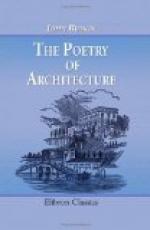150. Another cause to be noticed is the peculiar independence of the Englishman’s disposition; a feeling which prompts him to suit his own humor, rather than fall in with the prevailing cast of social sentiment, or of natural beauty and expression; and which, therefore,—there being much obstinate originality in his mind,—produces strange varieties of dwelling, frequently rendered still more preposterous by his love of display; a love universally felt in England, and often absurdly indulged. Wealth is worshiped in France as the means of purchasing pleasure; in Italy, as an instrument of power; in England, as the means “of showing off.” It would be a very great sacrifice indeed, in an Englishman of the average stamp, to put his villa out of the way, where nobody would ever see it, or think of him; it is his ambition to hear every one exclaiming, “What a pretty place! whose can it be?” And he cares very little about the peace which he has disturbed, or the repose which he has interrupted; though, even while he thus pushes himself into the way, he keeps an air of sulky retirement, of hedgehog independence, about his house, which takes away any idea of sociability or good-humor, which might otherwise have been suggested by his choice of situation.
151. But, in spite of all these unfortunate circumstances, there are some distinctive features in our English country houses, which are well worth a little attention. First, in the approach, we have one component part of effect, which may be called peculiarly our own, and which requires much study before it can be managed well,—the avenue. It is true that we meet with noble lines of timber trees cresting some of the larger bastions of Continental fortified cities; we see interminable regiments of mistletoed apple trees flanking the carriage road; and occasionally we approach a turreted chateau[26] by a broad way, “edged with poplar pale.” But, allowing all this, the legitimate glory of the perfect avenue is ours still, as will appear by a little consideration of the elements which constitute its beauty.
[Footnote 26: Or a city. Any one who remembers entering Carlsruhe from the north by the two miles of poplar avenue, remembers entering the most soulless of all cities, by the most lifeless of all entrances.]
152. The original idea was given by the opening of the tangled glades in our most ancient forests. It is rather a curious circumstance that, in those woods whose decay has been most instrumental in forming the bog districts of Ireland, the trees have, in general, been planted in symmetrical rows, at distances of about twenty feet apart. If the arrangement of our later woods be not quite so formal, they at least present frequent openings, carpeted with green sward, and edged with various foliage, which the architect (for so may the designer of the avenue be entitled) should do little more than reduce to symmetry and place in position, preserving, as much as possible,




